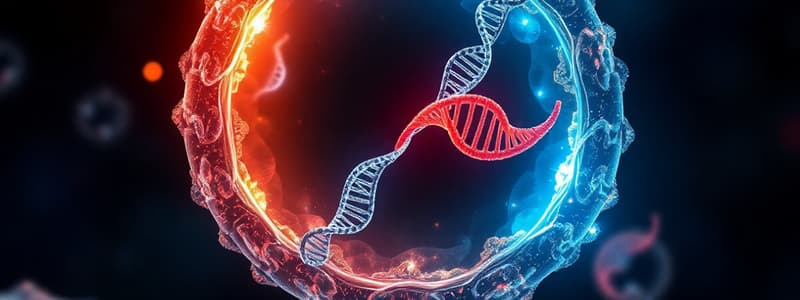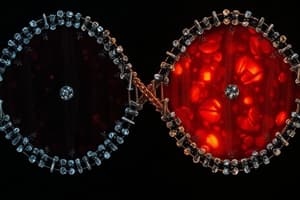Podcast
Questions and Answers
What is the primary purpose of mitosis?
What is the primary purpose of mitosis?
- To produce energy for the cell
- To divide the cell nucleus (correct)
- To replicate DNA
- To synthesize proteins
Which of the following stages occurs after prophase in mitosis?
Which of the following stages occurs after prophase in mitosis?
- Metaphase (correct)
- Telophase
- Anaphase
- Interphase
During which phase of the cell cycle do cells grow and produce new molecules and organelles?
During which phase of the cell cycle do cells grow and produce new molecules and organelles?
- Mitosis
- Interphase (correct)
- Prophase
- Anaphase
In terms of chromosome pairs, how many pairs are found in human beings?
In terms of chromosome pairs, how many pairs are found in human beings?
What are the sex chromosomes in humans?
What are the sex chromosomes in humans?
What occurs during prophase in mitosis?
What occurs during prophase in mitosis?
What is the main activity that takes place during metaphase?
What is the main activity that takes place during metaphase?
Which statement describes the process during anaphase?
Which statement describes the process during anaphase?
What happens during telophase?
What happens during telophase?
What is cytokinesis?
What is cytokinesis?
Flashcards are hidden until you start studying
Study Notes
Cell Division
- Process where a single cell divides into two or more daughter cells
- Enables growth, development, and repair in multicellular organisms
Chromosomes
- Contain genetic information in the form of DNA and RNA
- Essential for inheritance and cell function
DNA
- Deoxyribonucleic acid
- Stores the genetic code that determines an organism's traits
- Contains the instructions for growth and development
Human Chromosomes
- Humans have 23 pairs of chromosomes, totaling 46 chromosomes
- 22 pairs are autosomes, responsible for non-sexual traits
- 1 pair is sex chromosomes (X and Y)
- XY determines male sex, XX determines female sex
Mitosis
- A type of cell division that produces two daughter cells genetically identical to the parent cell
- Essential for growth, repair, and asexual reproduction
- Consists of four main stages: prophase, metaphase, anaphase, and telophase
Interphase
- The period between mitotic divisions when the cell grows and replicates its organelles and DNA
- Prepares the cell for the next round of division
Prophase
- The first and longest stage of mitosis
- Chromosomes condense and become visible
- The mitotic spindle forms, which will pull the chromosomes apart
- The nuclear envelope breaks down
Metaphase
- The second stage of mitosis
- Chromosomes align at the center of the cell, forming the metaphase plate
- The spindle fibers attach to the centromeres of the chromosomes
Anaphase
- The third stage of mitosis
- Sister chromatids separate and move to opposite poles of the cell
- The cell elongates as the poles move further apart
Telophase
- The final stage of mitosis
- The chromosomes reach the poles, and the nuclear envelope reforms around each set of chromosomes
- The chromosomes decondense
- The cytoplasm divides, forming two daughter cells
Studying That Suits You
Use AI to generate personalized quizzes and flashcards to suit your learning preferences.



